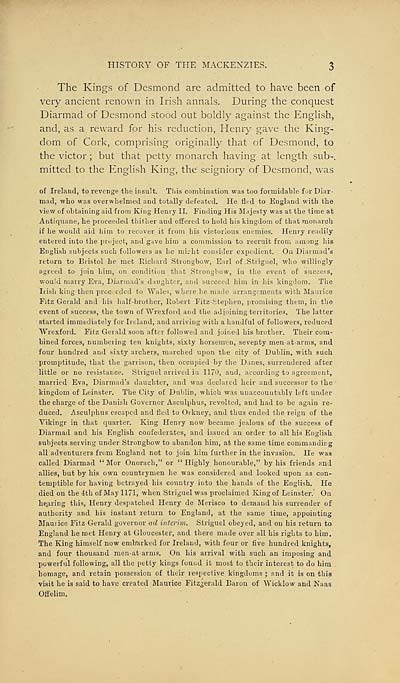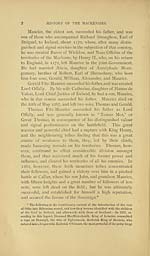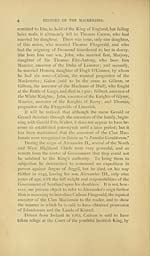History of the clan Mackenzie
(29) Page 3
Download files
Complete book:
Individual page:
Thumbnail gallery: Grid view | List view

HISTORY OF THE MACKENZIES. 3
The Kings of Desmond are admitted to have been of
very ancient renown in Irish annals. During the conquest
Diarmad of Desmond stood out boldly against the English,
and, as a reward for his reduction, Henry gave the King-
dom of Cork, comprising originally that of Desmond, to
the victor ; but that petty monarch having at length sub-,
mitted to the English King, the seigniory of Desmond, was
of Ireland, to revenge the insult. This combination was too formidable for Diar-
mad, who was overwhelmed and totally defeated. He fled to England with the
view of obtaining aid from King Henry II. Finding His Majesty was at the time at
Antiquane, lie proceeded thither and offered to hold his kingdom of that monarch
if he would aid him to recover it from his victorious enemies. Henry readily
entered into the project, and gave him a commission to recruit from among his
English subjects such followers as he miidit consider expedient. On Diarmad's
return to Bristol he met Richard Strongbow, Earl of Striguel, who willingly
agreed to join him, on condition that Strongbow, in the event of success,
would marry Eva, Diarmad's daughter, and succeed him in his kingdom. The
Lish king then proceeded to Wales, where be made arrangements with Maurice
Fitz Gerald and his half-brother, Robert Fitz-Stepherj, promising them, in the
event of success, the town of Wrexford and the adjoining territories. The latter
started immediately for Ireland, and arriving with a handful of followers, reduced
Wrexford. Fitz Gerald soon after followed and joined his brother. Their com-
bined forces, numbering ten knights, sixty horsemen, seventy men-at-arms, and
four hundred and sixty archers, marched upon the city of Dublin, with such
promptitude, that the garrison, then occupied by the Danes, surrendered after
little or no resistance. Striguel arrived in 1170, and, according to agreement,
married Eva, Diarmad's daughter, and was declared heir and successor to the
kingdom of Leinster. The City of Dublin, which was unaccouutably left under
the charge of the Danish Governor Asculphus, revolted, and had to be again re-
duced. Asculphus escaped and fled to Orkney, and thus ended the reign of the
Vikingr in that quarter. King Henry now became jealous of the success of
Diarmad and his English confederates, and issued an order to all his English
subjects serving under Strongbow to abandon him, at the same time commanding
all adventurers from England not to join him further in the invasion. He was
called Diarmad " Mor Onorach," or " Highly honourable," by his friends and
allies, but by his own countrymen he was considered and looked upon as con-
temptible for having betrayed his country into the hands of the English. He
died on the 4th of May 1171, when Striguel was proclaimed King of Leinster.' On
hearing this, Henry despatched Henry de Merisco to demand his surrender of
authority and his instant return to England, at the same time, appointing
Maui ice Fitz-Gerald governor ad interim. Striguel obeyed, and on his return to
England he met Henry at Gloucester, and there made over all his rights to him.
The King himself now emburked for Ireland, with four or five hundred knights,
and four thousand men-at-arms. On his arrival with such an imposing and
powerful following, all the petty kings found it most to their interest to do him
homage, and retain possession of their respective kingdoms ; and it is on this
visit he is said to have created Maurice Fitzjerald Baron of Wicklow and Naas
OfCelim.
The Kings of Desmond are admitted to have been of
very ancient renown in Irish annals. During the conquest
Diarmad of Desmond stood out boldly against the English,
and, as a reward for his reduction, Henry gave the King-
dom of Cork, comprising originally that of Desmond, to
the victor ; but that petty monarch having at length sub-,
mitted to the English King, the seigniory of Desmond, was
of Ireland, to revenge the insult. This combination was too formidable for Diar-
mad, who was overwhelmed and totally defeated. He fled to England with the
view of obtaining aid from King Henry II. Finding His Majesty was at the time at
Antiquane, lie proceeded thither and offered to hold his kingdom of that monarch
if he would aid him to recover it from his victorious enemies. Henry readily
entered into the project, and gave him a commission to recruit from among his
English subjects such followers as he miidit consider expedient. On Diarmad's
return to Bristol he met Richard Strongbow, Earl of Striguel, who willingly
agreed to join him, on condition that Strongbow, in the event of success,
would marry Eva, Diarmad's daughter, and succeed him in his kingdom. The
Lish king then proceeded to Wales, where be made arrangements with Maurice
Fitz Gerald and his half-brother, Robert Fitz-Stepherj, promising them, in the
event of success, the town of Wrexford and the adjoining territories. The latter
started immediately for Ireland, and arriving with a handful of followers, reduced
Wrexford. Fitz Gerald soon after followed and joined his brother. Their com-
bined forces, numbering ten knights, sixty horsemen, seventy men-at-arms, and
four hundred and sixty archers, marched upon the city of Dublin, with such
promptitude, that the garrison, then occupied by the Danes, surrendered after
little or no resistance. Striguel arrived in 1170, and, according to agreement,
married Eva, Diarmad's daughter, and was declared heir and successor to the
kingdom of Leinster. The City of Dublin, which was unaccouutably left under
the charge of the Danish Governor Asculphus, revolted, and had to be again re-
duced. Asculphus escaped and fled to Orkney, and thus ended the reign of the
Vikingr in that quarter. King Henry now became jealous of the success of
Diarmad and his English confederates, and issued an order to all his English
subjects serving under Strongbow to abandon him, at the same time commanding
all adventurers from England not to join him further in the invasion. He was
called Diarmad " Mor Onorach," or " Highly honourable," by his friends and
allies, but by his own countrymen he was considered and looked upon as con-
temptible for having betrayed his country into the hands of the English. He
died on the 4th of May 1171, when Striguel was proclaimed King of Leinster.' On
hearing this, Henry despatched Henry de Merisco to demand his surrender of
authority and his instant return to England, at the same time, appointing
Maui ice Fitz-Gerald governor ad interim. Striguel obeyed, and on his return to
England he met Henry at Gloucester, and there made over all his rights to him.
The King himself now emburked for Ireland, with four or five hundred knights,
and four thousand men-at-arms. On his arrival with such an imposing and
powerful following, all the petty kings found it most to their interest to do him
homage, and retain possession of their respective kingdoms ; and it is on this
visit he is said to have created Maurice Fitzjerald Baron of Wicklow and Naas
OfCelim.
Set display mode to:
![]() Universal Viewer |
Universal Viewer | ![]() Mirador |
Large image | Transcription
Mirador |
Large image | Transcription
Images and transcriptions on this page, including medium image downloads, may be used under the Creative Commons Attribution 4.0 International Licence unless otherwise stated. ![]()
| Histories of Scottish families > History of the clan Mackenzie > (29) Page 3 |
|---|
| Permanent URL | https://digital.nls.uk/95039934 |
|---|
| Description | A selection of almost 400 printed items relating to the history of Scottish families, mostly dating from the 19th and early 20th centuries. Includes memoirs, genealogies and clan histories, with a few produced by emigrant families. The earliest family history goes back to AD 916. |
|---|

